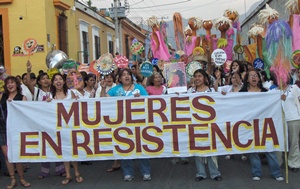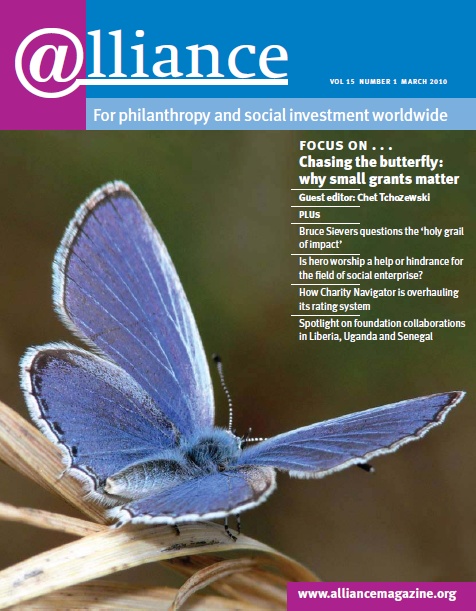After 25 years of funding women’s human rights organizations throughout the world, Mama Cash recently launched its new grantmaking strategy. The key changes from our work in the past are a switch from a regional to an issues-based approach, giving longer-term and larger grants, and giving fewer grants. By focusing on a smaller pool of groups, we hope to gain a deeper understanding of the issues they are addressing, and to better assist our grantees to create and take opportunities to learn, grow, and effectively defend and advance women’s and girls’ rights.
 The global context
The global context
Women’s human rights movements are at a tipping point. Decades of work on the part of women’s rights activists, scholars and leaders are beginning to bear fruit. Governments and funders are more widely recognizing women’s human rights and the centrality of women’s empowerment to family, community and national well-being. However, the analysis that finds its way on to the front pages of global media outlets emphasizes the empowerment of individual women through microcredit and self-improvement programmes. This ‘one woman at a time’ approach stands in contrast to the basic aims of women’s rights movements: to change the laws, policies and attitudes that affect entire classes of people and to address the structural and root causes of social and economic inequality.
But women’s rights organizations are still grossly underfunded. If they are to take advantage of the opportunities that are now opening up, this situation has to change.
Moving beyond the regional approach
Both the world and women’s rights activism have changed. Many challenges facing women, such as the right to live free from violence, are global in reach and it makes sense to attack them thematically rather than regionally and symptomatically. In response, we are moving away from regional divisions. Organizing our grantmaking thematically across regions, we can use our influence to help build alliances, leverage resources and help organizations and networks find new donors. Grantees such as the Pastoralist Girls Initiative in Kenya (a grassroots group that combats traditional practices that are harmful to girls, such as early marriage), can share experiences with other Mama Cash grantees working to end early marriage in other countries, such as India. In this way, we can strengthen individual women’s rights organizations and, at the same time, participate in creating powerful local, regional and international movements for change.
Recognizing the complexity of women’s lives
Mama Cash is now making grants in four interrelated thematic areas: body (freedom from violence and the safeguarding of sexual and reproductive rights), money (economic justice including inheritance and property rights), voice (representation and participation) and supporting women’s funds in countries in the global South and East.
While our grantmaking is now divided into thematic zones, we know that discrimination in one area of a woman’s life affects all areas. For this reason, women’s rights work seldom fits neatly into any one box. Most grantees work at the intersection of two or more themes, and we believe that some of the most exciting work is taking place at these intersections. One such group is the Association of Egyptian Female Lawyers, whose work focuses on the link between body and money by raising awareness about sexual harassment in the workplace as a violation of women’s right to safety and an impediment to their ability to take full advantage of the opportunities of paid work.
Women can do more with more
Over the years, Mama Cash has become known as a provider of small grants. This is not because we set out to be a small grantmaker. Many of our early grants were made to emerging, informal organizations for whom a small grant was the most appropriate means of assisting them to grow.
But organizations and movements mature. Many of the organizations we work with found that their ambitions to take their work to scale were limited by our one-off and mainly project grants that could not exceed €20,000. Our new approach is to provide more flexible grants to women’s organizations based on what they need and where they are in their life cycle. We continue to make small grants where we feel that it is appropriate, but we have increased our maximum grant to €50,000 a year.
Additionally, we have started making multi-year grants to groups that want to take big steps to build their organizations and increase their impact. One such example is MEMPROW in Uganda, which focuses on young women’s leadership. After years of being managed solely by volunteers, the group received a multi-year grant to hire paid staff to take its leadership programme to a new level of effectiveness over several years.
 One thing we very much took to heart in formulating our new strategies was the AWID report Where is the Money for Women’s Rights? AWID found that 65 per cent of women’s organizations have budgets of less than $50,000 a year and a majority have budgets under $10,000. Women’s organizations are living hand to mouth most of the time. For instance, many emerging women’s rights organizations function with all or largely volunteer labour. During the current economic crisis, organizations such as this sometimes have to cut back or even close altogether as women struggle to keep their families housed, fed and clothed.
One thing we very much took to heart in formulating our new strategies was the AWID report Where is the Money for Women’s Rights? AWID found that 65 per cent of women’s organizations have budgets of less than $50,000 a year and a majority have budgets under $10,000. Women’s organizations are living hand to mouth most of the time. For instance, many emerging women’s rights organizations function with all or largely volunteer labour. During the current economic crisis, organizations such as this sometimes have to cut back or even close altogether as women struggle to keep their families housed, fed and clothed.
The fact is that ambition, vision and courage are not enough. Women’s human rights organizations need money to grow, otherwise they will never become viable and sustainable. We must break with the traditional view that women can do more with less. As donors, we must shift our thinking to recognize that they can do even more with more funding. Activists for women and girls’ rights need more and longer-term funding to take their work to the next level of scale, influence and power.
It’s more than money
Our new approach is about more than writing bigger cheques. We are beginning to provide organizations with ‘accompaniment support’ to move towards a more thoughtful way of partnering for a common goal. Our accompaniment will include strategizing with grantees to help them position themselves with other donors, giving groups access to new spaces to voice their needs and priorities in their own words, and linking them with other grantees to forge new alliances.
Shared learning for greater impact
Mama Cash is now placing a much greater emphasis on what we and our grantees can learn from each other. We want to share in our grantees’ successes and in their failures, because so often we learn the most valuable lessons when work does not go according to plan. As part of this process, we now ask organizations to identify their own indicators for success. This can’t just be the number of training events held. We are pushing them to go deeper and ask themselves how they will know that their work has changed women’s lives. Clearly, this means that we also need to think harder about the ‘so what?’ element of what we do. One very concrete sign of the change in our approach to assessment is that we now have a programme officer dedicated to learning and evaluation who will develop our own indicators and help us learn from our errors as well as our accomplishments.
We have also changed our reporting requirements. Previously, with the grant letter, we sent out a questionnaire and asked organizations to fill it in and send it back at the end of the grant. That was more or less it. Now, we hold progress interviews after six months. We ask grantees how things are going, how they are managing financially and what Mama Cash can do to help. We review the goals and work plan that we established collaboratively at the beginning of the process and make adjustments to meet new circumstances. From our side, our aim is to conduct an assessment of Mama Cash by our grantees every two years. From now on, there will be more sharing of information both between us and our grantees and with other women’s organizations.
The goal: more money for real breakthroughs
While we are funding fewer organizations, we hope that our new approach will enable our grantees to find and take strategic opportunities to achieve larger-scale, more dramatic breakthroughs. In turn, we hope that these results will influence more donors to give to women’s rights. After more than 25 years of funding women’s rights, we feel we have the obligation to demonstrate, in a more compelling way, that achieving permanent change requires structural, social and cultural shifts.
In addition to providing critically needed funding for our grantees, we are also trying to make sure there is more money overall for women’s movements. We shouldn’t be saying, ‘I know you’ve asked for €20,000 but we think you can do the work with €10,000.’ Our goal is to ensure women’s rights are promoted and protected, whether it takes €5,000 or €50,000.
Nicky McIntyre and Annie Hillar are, respectively, executive director and director of programmes of Mama Cash. Emails n.mcintyre@mamacash.nl and a.hillar@mamacash.nl
For more information
http://www.mamacash.org
 Comment
Comment
Focusing on the processes of social change
Anne Firth Murray
I am pleased to comment on the article by Nicky McIntyre and Annie Hillar about the new strategic plan for Mama Cash, a funder that I have always seen as courageous and imaginative. Mama Cash and the Global Fund for Women were very much in sync, and we shared perspectives in a wonderful way over the years.
The context for the Mama Cash article is the steady growth of the women’s rights movements worldwide. The authors comment that women’s rights and the centrality of women’s empowerment to social change is being recognized by many – even governments and funders. Personally, I have observed that though there is much rhetoric about the centrality of women to positive change, budgets for supporting women’s groups are still too low, as the authors note. Most funders, though they may recognize the centrality of women’s participation, avoid the truly difficult human rights and health issues, such as access to safe and legal abortion, the complicated issue of sex trafficking, women’s circumstances in conflict and refugee settings, and so on.
Mama Cash plans to make some changes in its style of grantmaking: one change involves increasing the size of grants and reducing the number. Focusing on fewer grantees, the authors argue, will allow Mama Cash ‘to gain a deeper understanding of the issues’ and to better assist the grantees ‘to learn, grow, and effectively defend and advance women’s and girls’ rights’. I can understand how this strategy of fewer grants may be helpful to Mama Cash, but I am not clear about how Mama Cash is particularly suited to ‘better assist’ the grantees. What, specifically, is meant by ‘accompaniment support’ and what is it about Mama Cash itself that that will especially assist groups to meet their goals?
Furthermore, I fear that shifting to larger grants to stronger groups may result in smaller nascent women’s organizations needing to go elsewhere for funds. Where will they go? For example, funders like to support networks, but who will fund the little groups that comprise the networks? I hope budgets will rise, so that larger grants to stronger groups will not result in fewer grants to smaller, risk-taking groups that may be seeking a first grant.
Perhaps the fourth theme of the new plan at Mama Cash – supporting women’s funds in the global South and East – is designed to be a way of ensuring that small groups will receive grants from the regional or country-based women’s funds. That was one of my hopes early on at the Global Fund for Women, when we gave seed grants to women’s funds in Africa, India, Mexico and Nepal. But such women’s funds cannot cover the needs worldwide – for they do not exist everywhere – and so I worry about the situation of start-up groups working on unpopular issues.
At the same time as I call for the survival of small grants funds, I love the author’s clear statement that we must break ‘with the traditional view that women can do more with less’. Of course I heartily agree, but I do not agree with the goal of ‘more money’ for ‘real breakthroughs’. Money is not the key to fundamental change.
Another aspect of the new strategic plan – shifting from a regional approach to an ‘issues’ approach – though appealing, does not seem to me to tackle the issue of what needs to happen to effect fundamental change. My experience suggests that advancing the rights of women and girls does not necessarily lie in identifying particular areas of interest (eg body, money and voice, intriguing and vitally important as these emphases are) but in greater clarity about how the work is done and how relationships among women’s groups (and others) worldwide are forged.
Therefore, the authors’ emphasis on ‘shared learning’ suggests to me that they are on to something. I might go further to advocate ‘mutual empowerment’, even ‘love’, and urge donors to focus on processes of community-building and shared leadership. People who know me will recognize this mantra: ‘The way we do our work is more important than what we do.’ I would hope funders would focus more directly on the processes of social change – the how, not just the what, the where, and the how much.
I have immense respect for the sensitivity and wisdom of the authors, and I want to know more about their plans. Other donors will do well to take note of how the strategy of Mama Cash is given reality. Mama Cash has been ahead of the curve in the past, and I suspect that will be the case in the future as well.
Anne Firth Murray is Founding President, Global Fund for Women, Consulting Professor, Stanford University and author of Paradigm Found and From Outrage to Courage.Email afmurray@stanford.edu



Comments (0)